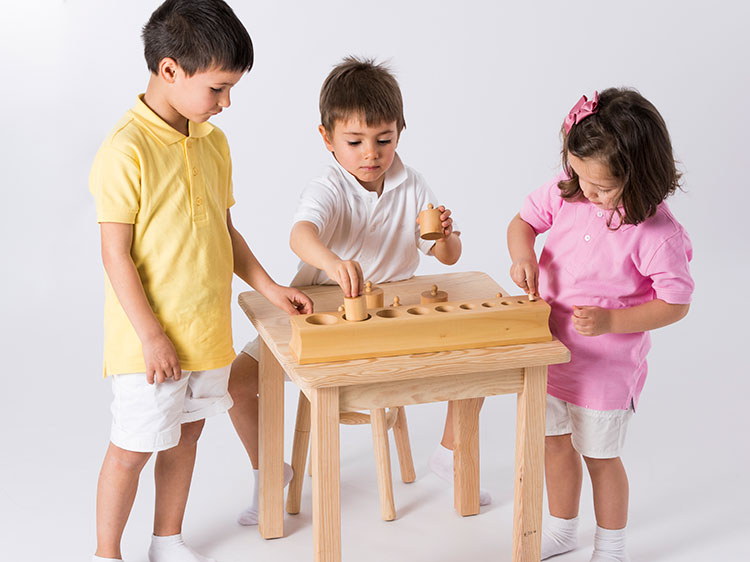Children aged 3 and older have already formed the concept of self.
At this stage, learning is fully conscious: I move to wherever I want and I change my environment. Learning arises spontaneously, and this is where our classroom environment offers endless opportunities. It is wide, open, tidy,pleasant, simple, real. A place where each element has a role to play in the children’s development.
The environment is carefully designed to suit children from 3 to 6 years old. It allows them to choose where and how they want to work, whether on their own or in groups, promoting independence in their relationship with the available resources and in the process of learning and finding answers to their needs.
Children will learn the importance and the pleasure of performing a task from beginning to end. They will develop their ability to concentrate, their confidence and the satisfaction of achievement.
The senses are still key factors. Montessori materials stimulate and sharpen the senses, since they all have their own qualities: smell, size, weight, texture, flavour, colour, etc. In this preschool period, when children receive an excessive amount of sensory information, these materials allow them to find order and meaning in the world.
Children aged 3 and older already have the foundations of language. In our environment,their language becomes richer, and they learn how to use it accurately, beautifully and properly. Writing is developed from the senses (hearing, touch). As a natural step, they learn how to read, which opens the world in all its splendour to them: geography, science, history, art, music. At this point, children establish their environment and their place in the world. They are a part of it;they understand, respect and love it; they develop a sense of solidarity and commitment.
Our proposal is that children discover the world and interpret it through four major areas shaping the spaces of this room: Practical life skills, Sense development, Mathematics and Language.
 Practical Life Skills Area
Practical Life Skills Area
These are activities teaching the children to take care of themselves, of others and of the environment. This includes cooking, sewing, cleaning, or tiding.I live what I see, I coordinate my body, I concentrate, I look after myself, I enjoy tidiness and cleanliness, I understand my surroundings, I feel at home, and finally Ifeel integrated.
Sense Development Area
The materials here allowthe children’s senses to be sharpened and developed. Taste, smell, sight, hearingand touchlay the foundations for further learning. It is through their senses that children explore the world and are able to absorb everything around them. The qualities are isolated so the children can focus their attention on one aspect.
Language Area
We propose activities where big steps towards reading and writing are taken. The body is seen as a means to feel and get to know the letters, exploring their sounds, observing their shapes and the images they represent, linking what is little by little understood.
Mathematics Area
Montessori materials provide the children with an insight into numbers and what they represent using their whole body: touching, working with shapes, sizes, colours, weights…The foundations are laid for more complex thinking, shifting from the more concrete aspects to more abstract thinking.

